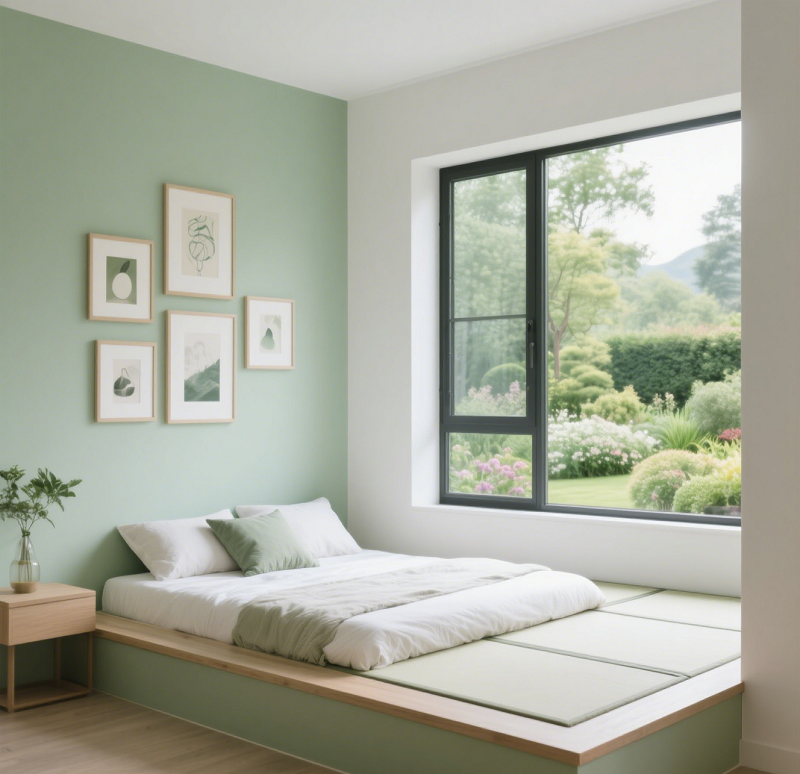Beautiful Plants For Your Interior

I. Introduction: The Importance of a Feng Shui Bedroom
- A. The Role of the Bedroom: More than just a place to sleep; it’s a sanctuary for rest, intimacy, and personal renewal.
- B. Why Bedroom Feng Shui Matters: Direct impact on sleep quality, health, relationships, and overall well-being.
- C. Core Principle: Balancing Yin (restful, calm) and Yang (active, vibrant) energies for optimal harmony.
II. Fundamental Feng Shui Principles for Bedrooms
A. Chi Flow: Gentle and Harmonious
- Avoid stagnant or overly fast-moving Chi.
- Promote a sense of peace and security.
B. Yin and Yang Balance: Prioritizing Yin
- The bedroom should be a predominantly Yin space (calm, dark, soft).
- Minimal Yang elements for balance (e.g., small light source, natural textures).
C. Command Position (Controlling Position)
- The most crucial placement for the bed.
- Allows you to see the door without being directly in line with it.
III. Key Elements of Feng Shui Bedroom Layout
A. Bed Placement: The Foundation of Good Feng Shui
This is the single most important aspect of bedroom Feng Shui.
- Command Position:
- Solid wall behind the headboard (support).
- Clear view of the door (awareness), but not directly in line.
- Avoid being directly under a window (lack of support, energy drain).
- Headboard:
- Solid and attached to the bed frame (stability, support).
- Avoid open or slatted headboards.
- Sides of the Bed:
- Equal space on both sides (equality in relationships, freedom of movement).
- Two nightstands (balance, support for partnership).
- Under the Bed:
- Keep clear (allow Chi to flow, avoid stagnant energy).
- Avoid storing clutter or emotionally charged items.
B. Furniture Arrangement: Practicality and Flow
- Avoid Clutter: Especially on nightstands and dressers, as it creates chaotic energy.
- Dressers/Wardrobes: Keep organized and functional. Avoid mirrors facing the bed.
- Seating: If space allows, comfortable seating can enhance relaxation, but avoid overcrowding.
C. Color Palette: Promoting Calm and Serenity
Choose colors that evoke peace and are predominantly Yin.
| Color Group | Associated Element | Feng Shui Effect | Examples |
|---|---|---|---|
| Earthy Tones | Earth | Grounding, stability, nourishment | Beiges, light browns, sandy tones, terracotta |
| Blues/Greens | Water / Wood | Calming, peaceful, refreshing | Soft blues, muted greens, teal |
| Warm Whites/Creams | Metal / Earth | Purity, simplicity, fresh start | Off-whites, ivory, cream |
| Soft Pinks/Corals | Fire (gentle) / Earth | Love, romance, compassion | Blush pink, peach, light coral (use sparingly) |
D. Lighting: Soft and Dimmable
- Use soft, ambient lighting.
- Dimmers are highly recommended for flexibility.
- Avoid harsh overhead lighting at night.
E. Artwork and Decor: Inspiring Peace and Connection
- Choose calming images (landscapes, abstract art, gentle themes).
- Pairs of objects or imagery for relationships (if applicable).
- Avoid violent, aggressive, or overly stimulating imagery.
- Limit electronics and exercise equipment (Yang energy).
IV. Common Feng Shui Pitfalls and Solutions in Bedrooms
A. Mirrors: A Common Challenge
- Problem: Mirrors facing the bed can create restless sleep, bring in “third-party” energy, or reflect arguments.
- Solution: Relocate, cover at night, or choose mirrors inside wardrobe doors.
B. Electronics and Work Items: Disrupting Rest
- Problem: TVs, computers, phones, and work documents introduce Yang energy and mental activity.
- Solution: Remove or hide them, keep phones away from the bed, create a digital detox zone.
C. Water Features: Generally Not Recommended
- Problem: Aquariums or indoor fountains can bring too much active Yang energy, potentially leading to financial loss or health issues.
- Solution: Best avoided in the bedroom.
D. Overhead Beams or Sloping Ceilings: Oppressive Energy
- Problem: Can create a feeling of pressure or oppression, leading to poor sleep or headaches.
- Solution: Drape fabric, use a canopy bed, or rearrange furniture if possible.
V. Conclusion: Cultivating a Personal Haven
- A. Recap: Emphasize bed placement, gentle Chi flow, and Yin/Yang balance.
- B. Personalization: Feng Shui is a guideline, not rigid rules. Trust your intuition.
- C. Final Thought: A well-feng shuied bedroom is an investment in your health, relationships, and overall life quality.


